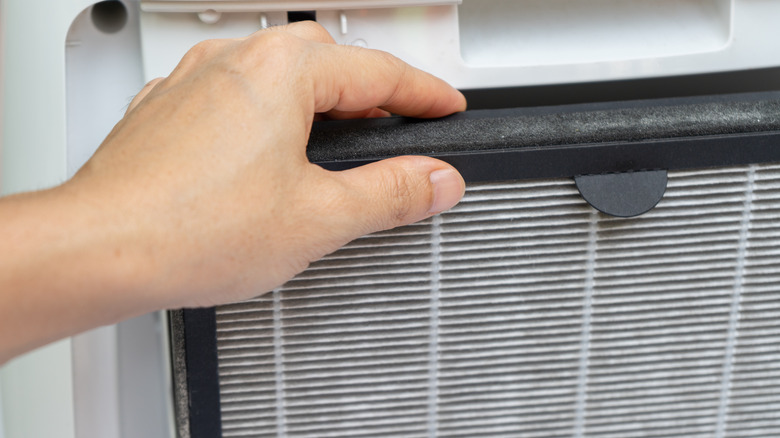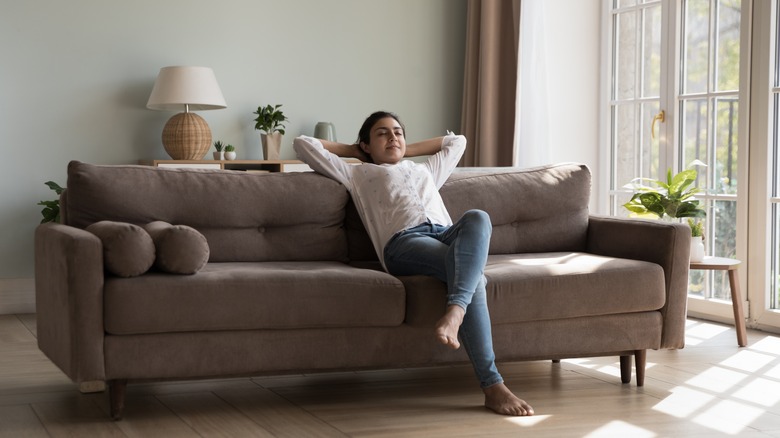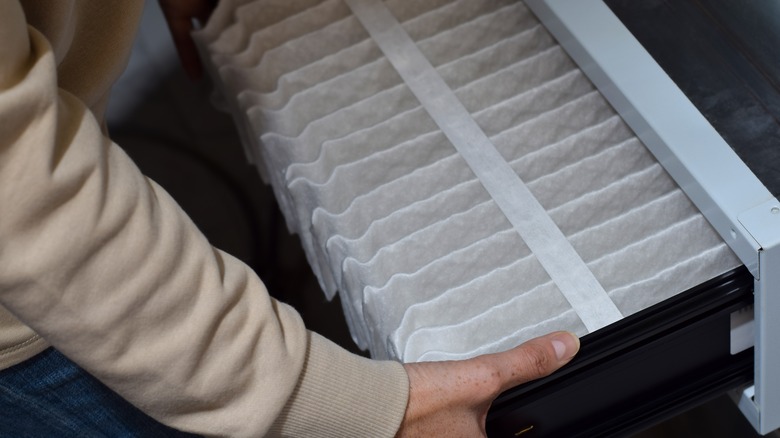How Much You Can Expect To Pay To Install A HEPA Air Purifier In Your HVAC System
Maintaining the quality of your home's air is serious business; Air quality is closely connected to overall health and is paramount for individuals who suffer from allergies or those with weak and developing respiratory systems (such as older adults and young children). While opening windows may be a free way to improve air quality, some homeowners will shell out significant money to secure the purest air for their homes' interiors. One method of cleaning indoor air is through the use of a HEPA air purification system — considered the gold standard for filtration systems. The downside? They cost a pretty penny to add to your home.
HEPA stands for "high efficiency particulate air;" filters with this title can trap up to 99.7% of all dust, mold particles, and pollen, according to the EPA, as well as any other debris of a certain size (0.3 microns). This is encouraging news for people who find it uncomfortable to breathe indoors, but you can expect to pay between $2,000 and $4,000 to install a HEPA filter in your home. Many older homes with conventional HVAC systems might also not be compatible with the configuration of ducts and vents that a HEPA system may need; if your home is like this, you may need to shell out an additional $450 to $2,180 to have your vents or ducts replaced, depending on your current setup. Shopping around for reputable companies will help you understand what is considered reasonable for installing a HEPA filtration system.
Additional costs to consider
Depending on your needs and resources, you may either be appalled at the price of a whole-house HEPA installation or perhaps take it in stride. Whatever your reaction, it is important to note that installing a HEPA filtration system will require certain ongoing costs. A conservative estimate is that you will need to replace your HEPA filter twice a year — roughly every six months — although some brands will recommend it more or less often. The frequency will ultimately correlate to the goings-on in your home and whether you have indoor pets or suffer from asthma and other respiratory challenges. Also, if you run the filter constantly to get rid of dust in the air, it will likely need to be changed more often.
You will need to keep on top of replacement filter costs as well, which can be anywhere from $25 to $100, subject to the brand and specifications of each filter. Multiply the price of the filter by two for annual materials expenditures, and don't forget to add in seasonal tune-ups or maintenance, which should likely be done as often as you change the filter. Some companies will offer free maintenance visits when you purchase a HEPA system through them, so be sure to shop around for the best long-term arrangement. Don't be afraid to ask if there's a way to get discounted seasonal tune-ups — some companies may be willing to strike a deal in order to gain your business.
Can you cut costs?
There may be online recommendations for ways to nickel and dime your way around the pricey HEPA installation and regular filter changes, but a word to the wise: don't. Vacuuming out or washing your HEPA filters in order to use them for longer, at best, will do little more than remove surface-level dirt. What you can be sure of, however, is that it will render your filter useless. It's better to partner with a reputable HVAC company specializing in HEPA filtration and trust their technicians when they do maintenance checks (and remember to look for warning signs from your HVAC system). If you are looking for more affordable filters than the technicians have on the truck, ask your HVAC company which filter you should purchase and buy them in multi-pack bundles online. This could shave off several dollars from each filter's cost.
Finally, if a whole-home HEPA filter installation is out of the question, you may be curious about standalone HEPA filters. Portable systems are more affordable than a whole home setup, but that does not necessarily translate to saving money in the long run. In fact, filters for portable systems can be pricey and may be less efficient than one master filter for the whole home. However, a standalone portable HEPA air purifier could be a good idea if you are particularly concerned about clean air in your bedroom or the baby's nursery.


